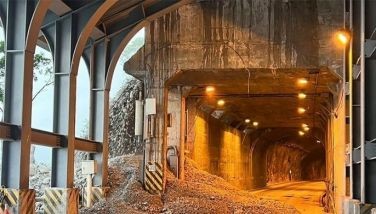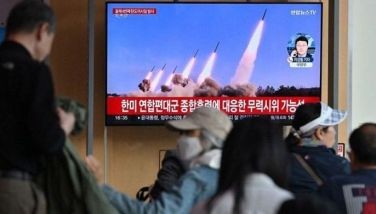Taiwan simulates attacks by political rival China
TAIPEI, Taiwan — Taiwan's military is simulating attacks by political rival China this week, despite an overall warming of ties, after Beijing staged what appeared to be a strike against the presidential office in Taipei.
The exercises, larger this year than in the past, follow televised images from China on July 22 depicting a mock ground troop attack on a red tower and attached low-rises that resembled Taiwan's presidential compound.
China is Taiwan's only major potential military threat and the two sides are separated by an ocean strait that is 160 km (100 miles) across at its narrowest point.
"Our most crucial goal is to simulate safeguarding against a possible attack from mainland China, whether on Taiwan itself, an outlying island post, our marine military space or our airspace," deputy Defense Ministry spokesman Chen Chung-chi said.
The drills, running Monday through Friday and known as the Han Kuang Exercise, involve 69 more aircraft than last year, Taiwan's government-funded Central News Agency reported. Many of the 63 drills will emphasize land-sea-air coordination.
Some drills are testing homegrown military hardware, including a drone system and Taiwan's first indigenous stealth missile corvette warship, Chen said.
Taiwan has shifted to designing its own hardware since 2010 as China mounted pressure on the United States, the island's chief overseas supplier, to stop arms sales.
Taiwan's proposed 2016 budget includes $92.5 million for developing diesel-electric submarines over four years, as well.
China has claimed sovereignty over Taiwan since the 1940s, when the Communists routed the Nationalists in a civil war. The Nationalists rebased in Taiwan, which China says must eventually be unified with the mainland.
The two sides have set aside their political dispute since 2008 to open a dialogue that has led to more than 20 agreements on trade, transit and investment. But the deals have failed to help Beijing's hopes of endearing Taiwan's public to the idea of unification.
In early 2014, tens of thousands protested after they felt one of the agreements, a service trade liberalization agreement, was moving too quickly through parliament. About 70 percent of Taiwanese prefer today's degree of autonomy from China, a government-conducted public opinion survey found late last year.
China has not openly threatened Taiwan since 2005, and the island's Defense Ministry is "intently in the process of grasping" the level of threat today, Chen said.
China's military is the third most powerful in the world and Taiwan's is No. 15, according to statistical database GlobalFirepower.com.
Relations with China could go into a freeze after a new president takes office in Taipei in May. The Jan. 16 election frontrunner has proposed no mechanism for dialogue that China would accept. Current President Ma Ying-jeou must step down next year due to term limits.
"We don't expect we will conduct any warfare in urban fashion near the presidential offices," said Alexander Huang, strategic studies professor at Tamkang University in Taiwan. But, he said, the Taiwan's military personnel are likely to "simulate that the Chinese penetrate to the heart of Taipei."
- Latest
- Trending































